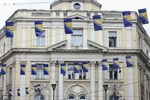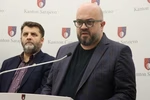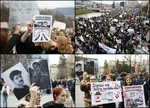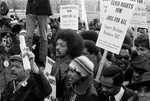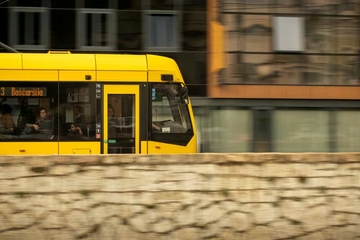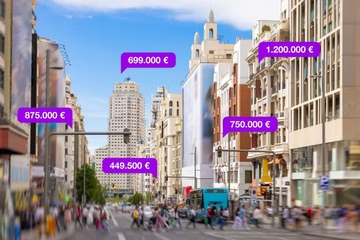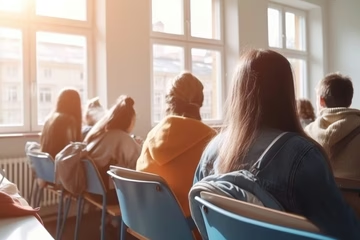US Ambassador in BiH: Dodik's increasingly vile, xenophobic, and bigoted rhetoric tears at the fabric of this county
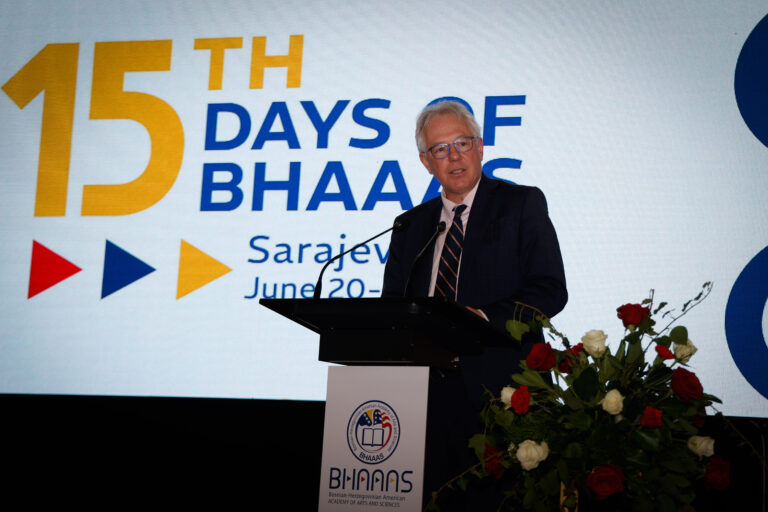
US Ambassador to Bosnia and Herzegovina Michael Murphy addressed the conference of the Bosnian Herzegovinian American Academy of Arts and Sciences in Bosnia and Herzegovina. He spoke about the importance of the diaspora's role in the realization of a common vision for the future of Bosnia and Herzegovina, but also about current problems. He warned that BiH was "moving in the wrong direction" and sent a message to "corrupt and malignant actors" who seek to undermine the Dayton Peace Agreement and threaten BiH.
Here is Murphy's speech from conference:
"Good evening, and welcome back to Bosnia and Herzegovina, the wonderful country that I have had the honour and privilege of serving in twice now. I want to thank the Academy for the warm welcome. It is a pleasure to join all of you again for the 15th Annual Days of the Bosnian Herzegovinian American Academy of Arts and Sciences in BiH.
In April, I had the pleasure of speaking with Academy President Dr Eldina Nizamic, a former member of our Embassy family, about the important role the roughly two million people who make up Bosnia and Herzegovina’s diaspora population play in our shared vision for this country’s future. The connections between Academy members and their BiH counterparts are an essential part of keeping BiH connected with the world, including the latest global trends and innovations in a wide range of areas.
The United States remains steadfast in its support for the sovereignty, territorial integrity, and multiethnic character of a Bosnia and Herzegovina that is part of a stable, secure, and prosperous Western Balkans, and in its support for Bosnia and Herzegovina’s integration into Euro-Atlantic institutions, both NATO and the EU. This has been a cornerstone of U.S. policy towards BiH for over 30 years, and it has enjoyed bipartisan support.
The United States partners with committed and often courageous individuals here in BiH who are dedicated to working toward our shared vision of a peaceful, democratic, and prosperous Bosnia and Herzegovina inside Euro-Atlantic institutions and in which its governments – at all levels – work for the benefit of all this country’s citizens.
The diaspora community – all of you – are essential partners in this effort. The people-to-people and economic ties you foster and the bonds you maintain bind the United States and Bosnia and Herzegovina together in ways that vastly overshadow the work that one Ambassador, or even an entire embassy, can accomplish alone.
And because of our commitment to BiH, we are looking to tap into all of you to advance our shared goals. That’s why, seven years ago, the U.S. government launched the Diaspora Invest Program to attract and support investment coming from Bosnians and Herzegovinians abroad. Our assumption was that, if we extended support to diaspora investors, they would establish a long-term business presence here in BiH. This has proven to be a winning concept.
Our work with diaspora investors has supported 232 startups and early-stage firms that have hired more than 3,000 people, invested $38 million in BiH, and sold more than $200 million worth of goods and services in 2023 alone, with three-quarters of those sales generated in exports. In fact, these diaspora companies now make up 1.6 percent of all exports from Bosnia and Herzegovina – an impressive feat considering that almost all these firms were established during the past seven years.
One of our current priorities for this program is connecting successful members of the diaspora from a variety of industries and areas of expertise with people and companies here to share their knowledge and skills gained outside Bosnia and Herzegovina. The Bosnian Herzegovinian Academy of Arts and Sciences is, of course, one of the best examples of the power of knowledge exchange between the diaspora and BiH.
So, I would like to put in a quick plug: we would be honoured to have more Academy members join us as mentors in the Diaspora Invest Program.
My team and I are proud of this work, and we are excited about the prospects of continuing to bring diaspora investments, knowledge, and expertise to BiH. However, I would be remiss if I simply celebrated our successes in BiH and failed to speak honestly about the challenges confronting the country.
Unfortunately, BiH is heading in the wrong direction. The Dayton Peace Agreement has helped keep the peace since November 1995, but it is fraying under regular attacks, mostly from the Republika Srpska and its President Milorad Dodik. Many of the successful state-building reforms painstakingly put in place after the war are collapsing under the weight of corrupt, selfish, and self-interested politicians. Institutions, such as the Armed Forces, the Border Service, and the High Judicial and Prosecutorial Council, are regularly and deliberately starved of the resources they require to succeed.
Right now, BiH faces perhaps the worst political environment since the 1990s.
Almost every day, we see virulent, ethnonationalist, and divisive rhetoric and actions from across the political and ethnic spectrum, and from all parts of the country. As I already noted, Milorad Dodik bears particular responsibility for these problems. His increasingly vile, xenophobic, and bigoted rhetoric tears at the fabric of this county, and his secessionist actions directly threaten the Dayton Peace Agreement. His authoritarian approach to governance bears a clear resemblance to, as he puts it, his “close friend” Vladimir Putin, and it robs the residents of the Republika Srpska of their fundamental rights and freedoms.
Mr. Dodik’s plan for the “peaceful disassociation” of the Republika Srpska from BiH is a dangerous fantasy, illegal, and a threat to the United States’ core interests in BiH. It is also a threat to the peaceful, prosperous, and democratic future inside Euro-Atlantic institutions that the people of BiH want and deserve.
Sadly, though, the toxic politics of division is not confined to the Republika Srpska. A worsening cycle of ethnonationalist call and response is having a tangible and negative effect on the lives of all BiH citizens. OSCE data shows that bias-motivated incidents, hate crimes, and instances of hate speech are increasing across BiH.
Ethnic minorities, often Bosniak returnees to communities in the RS, are the most frequently victimized. Serbs and Croats also report experiencing threats and discrimination in areas of BiH where they are in the minority. Genocide denial and the glorification of war criminals continue to divide communities and thwart reconciliation efforts across the country.
At the same time, endemic corruption is eating away at BiH’s democratic fabric as well as eroding its prospects for prosperity. It puts at risk BiH’s Euro-Atlantic integration, and it exposes BiH to outside malign influence. It infects all aspects of citizens’ lives, from politics to business and education to health care. As President Biden has said, “Corruption is a cancer that eats away at a citizen’s faith in democracy, diminishes the instinct for innovation and creativity…wastes the talent of entire generations…and scares away investments and jobs.”
Most, if not all of you, live in places where you experience nothing like this. You live in places where hard work, and perhaps a little luck, mean that you can get ahead, and where your success does not depend on your political affiliation or your connections.
You live in places where you can trust that you do not need to offer a bribe to get the permits you need to start a business, to ensure you receive adequate healthcare, or to secure a passing grade on a university exam.
Obviously, we know the United States has its own challenges. But as Americans, we collectively agree to abide by a system of laws that is applied equally to all, with predictable judicial processes, and in an environment where you can – as you all have demonstrated – build a better life for your children and grandchildren. That is what the people of BiH want and deserve.
Regrettably, many political leaders here in BiH do not care about what their constituents want, or what citizens deserve in terms of government transparency, accountability, and service delivery. As I have heard from too many BiH citizens over the years, they want to live in a country that “works.” And I don’t blame them.
Consequently, BiH citizens are voting with their feet. Emigration is of course difficult to track because the BiH government does not collect this data. However, sound estimates suggest the population of BiH has declined by roughly 30 percent since the last census in 2013.
Media frequently report that over 50,000 people leave BiH every year. According to the best and most reliable demographers, there is likely somewhere between 2.5 and 2.8 million people living permanently in BiH.
The relentless ethnonationalist rhetoric, increasing extremism, poor employment prospects, endemic corruption, and dysfunction at all levels of government are driving citizens to pursue opportunities elsewhere. This hollowing out of the country includes many of the best and brightest, and large swaths of open-minded youth. This brain drain is one of the greatest threats to BiH.
Estimates suggest that youth make up about 15 percent of BiH’s current population, and studies by the UN and the Friedrich Ebert Foundation find that over sixty percent of them report a desire to make their future outside of this country. They report that they do not see a future in BiH and hope to leave as soon as the opportunity presents itself.
The damaging exodus of young people from BiH is not only about a perceived lack of opportunity. Trust among Bosniak, Croat, and Serb youth has deteriorated.
The general atmosphere of ethnic tension and division, perpetuated by political leaders, some in the media, and in schools, contribute to the negative perspective reported by BiH youth. I have heard from many who believe that multiethnic interaction was better 18 years ago when I first arrived in BiH than it is today. Citizens now live in even more ethnically homogenous communities, and there is a distinct lack of opportunities for youth to travel around the country and to meet or meaningfully interact with their peers from other ethnic groups.
Education in BiH provides a good example of how divided government gets in the way of what BiH needs. Ethnic divisions in schools cultivate and strengthen ethno-national identities from a young age. With few exceptions, students across BiH are educated in schools in which they have little or no interaction with members of ethnic groups other than their own and, in most cases, learn conflicting versions of national history and culture.
As a result, many young people in BiH today are more ethnonationalist than their parents, who were directly impacted by the war but also remember life in a more diverse and ethnically mixed society.
Furthermore, the largely out-of-date curricula implemented in BiH schools are not adequately preparing students to compete in the 21st century workforce and undermine the creation of a more democratic and prosperous BiH on the Euro-Atlantic path.
According to a 2022 survey by USAID, youth across BiH said they trust representatives of their own ethnic group considerably more than other groups. One-third indicated they would not have an intimate relationship with someone belonging to a different ethnicity. The same USAID study found that the country’s youth see little opportunity to influence change, leading to feelings of helplessness and overall passivity. Most reported that they do not feel their voices matter in political discourse, and few expressed an interest in politics or other forms of civic engagement.
This information is certainly discouraging, but we should not let it dampen our optimism and hope for Bosnia and Herzegovina’s future.
Our Embassy works with impressive young activists fighting through the system to change BiH society for the better. Change never comes quickly, and too often here in BiH, young changemakers face intimidation, threats, and exclusion.
Now more than ever, young people need to understand the critical role active citizenship plays in a democracy and the power they hold to help shape the future they want for themselves and for BiH.
That is why the United States Embassy is proud to stand side-by-side with civically minded youth in BiH. Our Balkan Youth Leaders program – BOLD – boasts a membership of over 3,000 young people working to make a difference through civic engagement and economic development efforts. The BOLD program offers educational and cultural exchanges, training, project funding, and opportunities to for young people to network. Our Interethnic Reconciliation and Youth Program provides funding for projects and initiatives to foster multicultural cooperation and dialogue, and to promote intercommunity exchange, and collaboration.
We seek to strengthen the ability of young people to envision and implement positive changes in their communities through joint community-based projects… projects that help develop increased tolerance and cooperation between the ethnically and geographically diverse communities of BiH, and that contribute to a multicultural, peaceful, and stable BiH that thrives on its diversity.
Our Youth Leadership Program brings secondary school students and teachers from BiH to Dayton, Ohio where they engage in intercultural experiences and skills workshops. They engage with U.S. high school students, visit local NGOs, and speak with Dayton civic leaders. As a result, they better understand civic participation and the roles and responsibilities of a leader in a diverse democracy. They explore critical thinking, consensus building, and community service as tools for advocacy and leadership. Perhaps most importantly, for many students, the Youth Leadership Program is their first opportunity to spend time with, talk to, and build friendships with young people from different ethnic backgrounds.
The Kennedy-Lugar Youth Exchange and Study program (YES) sends students from BiH to the United States where they live with host families and attend a local high school. Its counterpart program, YES Abroad, brings American students to live with host families and attend school in BiH. Alumni of both programs maintain long-lasting ties to their host families, host communities, and host countries – building stronger bonds between the United States and BiH on a person-to-person level.
And for the second year in a row, our Diaspora Invest Program will soon bring a cohort of interns from the diaspora to BiH to spend the month of August working for local companies, reacquainting with their culture, language, friends, and families, and making deep, lasting connections to their homeland. One of last year’s successes included helping to create a web platform for digital nomads that has already been used by hundreds of people coming to live and work in the BiH. I cannot wait to see what this year’s cohort achieves.
The impact of these programs is positive, but they reach only a tiny fraction of the youth population who might benefit from them. That is why I want to issue a call to action to Academy members and the whole BiH Diaspora. Now is the time for increased investment in BiH and in the country’s youth.
I encourage you to devote your time and resources to facilitating more opportunities here in BiH; to work with the U.S. Embassy and our partners in Bosnia and Herzegovina to advocate for the changes necessary to secure a peaceful, democratic, and prosperous future for this country; to support those working day in and day out to improve the situation here; and to denounce ethnonationalist and divisive rhetoric and push for reconciliation and compromise.
The time for action is now. Before thousands more youth leave the country; and before social divisions and tensions threaten the very structure of the state.
The challenges facing Bosnia and Herzegovina are considerable, but BiH does not face them alone. The United States is resolved to restore the strength and capability of the institutions that the citizens of Bosnia and Herzegovina depend upon and are necessary for the country to complete its journey towards integration into Euro-Atlantic institutions.
We will continue advocating for a democratic and inclusive society and for measures to ensure free and fair elections, which is why we strongly supported the High Representative’s March decision to enact election integrity measures. The High Representative and his authorities are part of the solution here, not part of the problem. If he leads and acts, when necessary, he can facilitate BiH’s journey towards the European Union.
We are resolved to respond to corrupt and malign actors who seek to undermine the Dayton Peace Agreement and BiH’s Constitution, and who threaten Bosnia and Herzegovina’s territorial integrity, sovereignty, and multiethnic character.
We are resolved to leverage all the international community’s authorities and deterrent powers when necessary. This includes strong support for the High Representative and his use of the Bonn Powers.
The United States is proud to stand alongside Bosnia and Herzegovina, as it always has, and to push for a BiH that is democratic, prosperous, and delivers for all its citizens. No other country has been more committed to that future for BiH, nor invested more in its fulfilment, than the United States. That will not change.
My team and I work every day to create a BiH where citizens can stay, enjoy their lives, prosper, and raise their families".
Kakvo je tvoje mišljenje o ovome?
Učestvuj u diskusiji ili pročitaj komentare





 Srbija
Srbija
 Hrvatska
Hrvatska
 Slovenija
Slovenija










